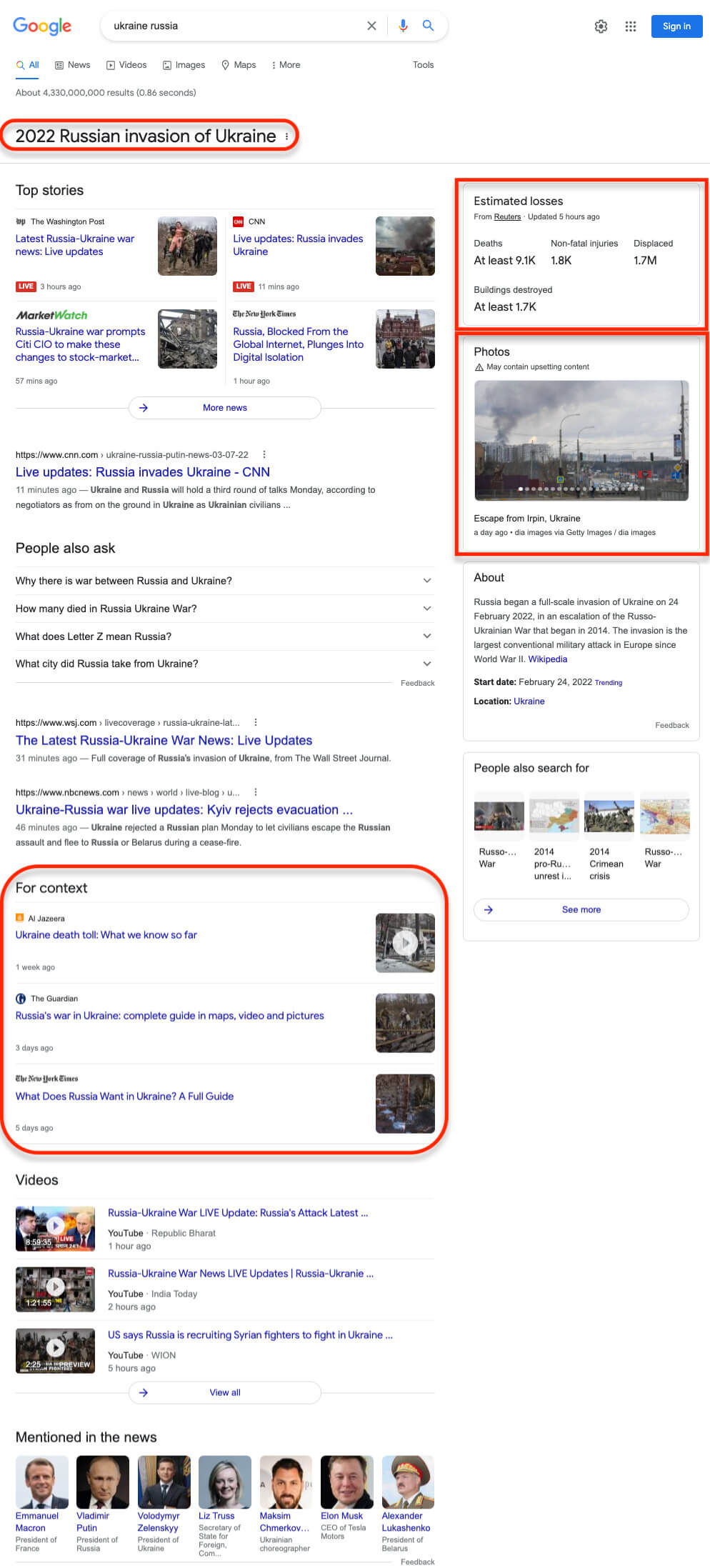Google typically updates its search engine results page (SERP) gradually, by testing out new features or updating existing ones. However, the company may roll out more drastic redesigns and new search features under certain circumstances, such as when there is heightened demand for information about a new topic, like there was during the outset of the coronavirus pandemic.
Demand for information about the tragic events unfolding in Ukraine may have prompted Google to revamp its SERPs for related queries (like [Ukraine Russia]). While some of the new features may be specific to the conflict, the company may eventually roll out those features (or similar ones) for more queries, which can impact organic visibility opportunities for brands.
The “2022 Russian invasion of Ukraine” SERP. One obvious distinction between other SERPs and the SERP for queries related to the conflict in Ukraine is the headline that appears at the top: “2022 Russian invasion of Ukraine.”
Our research showed that the headline did not always appear, even for the same query (when signed into the browser, compared to private browsing mode). Whether the headline was present or not, most search features remained consistent for this query.
Other distinct search features include:
- Estimated losses section– This new section shows details about the number of deaths, non-fatal injuries, displaced civilians and destroyed buildings. In this specific instance, Google is sourcing these figures from Reuters.
- Photos carousel – This is distinct from the image carousel that typically appears in the main column of search results in that they’re not Image search results. Instead, these photographs are licensed from Getty Images and users can only scroll through them (users cannot click on them).
- For context section – This feature appears in the main search results column and contains articles that provide background information on the topic. In the example above, the articles in the For context section are several days old, which contrasts with Top stories articles and other organic, non-rich results that are showing content published within the last day. A variant of this feature was spotted in 2020.
Our research also revealed that a knowledge panel may show for these queries. While it does not show in the example above, in the cases in which a knowledge panel was present, it included the Estimated Losses section as well as the photos carousel.
For queries related to the conflict, Google seems to be showing search results from well-known media outlets, which is consistent with its emphasis on expertise, authoritativeness and trustworthiness for “Your Money or Your Life” (YMYL) topics.
Get the daily newsletter search marketers rely on.
The mobile version. The mobile version of Google’s search results for associated queries looks more like the standard mobile experience, with a few notable carryovers from the special desktop SERP.

As shown above, the mobile SERP can also show a headline, Estimated losses, the For context section as well as the photos carousel.
The Russian version of the SERP. Users in Russia are shown a different version of the search results — one that is much more similar to generic SERPs, which may downplay the magnitude of the conflict for users.
One reason the SERP differs is due to Russia’s censorship laws, which restrict the publications that Google can show to users in Russia. As you can see from the example, there is no Estimated losses section or photos carousel.
Why we care. The last time we saw a SERP redesign like this was for the COVID search results, and elements from that UI have since appeared on more SERPs. Likewise, the layout or features from the “2022 Russian invasion of Ukraine” SERP may eventually receive a wider rollout.
Features like the For context and Estimated losses section are likely to be used for SERPs related to conflicts and natural disasters, but the impacts of these changes can be hard to predict. For instance, the results for [corona] Once prominently mentioned the beer brand, but since the pandemic, those mentions have been pushed below the fold. As with any change to the SERP and its features, there can be a variety of implications for brands, depending on the implementation and query.
New on Search Engine Land
.
Follow us on Facebook | Twitter | YouTube
WPAP (907)



